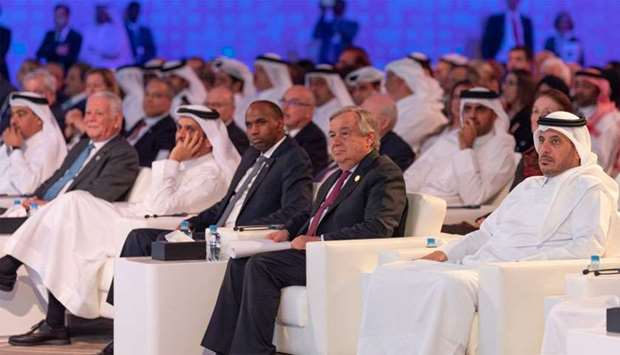*World leaders gather in Doha to discuss and find solutions to the most pressing problems faced by the global community
The 2018 Doha Forum, held under the patronage of His Highness the Amir Sheikh Tamim bin Hamad al-Thani, ended on Sunday after two days of thought-provoking discussions around the world’s most pressing challenges.
Under the theme “Shaping Policy in an Interconnected World”, this year’s edition brought together international decision-makers, heads of state, ministers, business executives and advocates to examine policy around the critical challenges facing the world today.
Key speakers included the Iranian Foreign Minister, Mohamed Javad Zarif, Nobel Laureate Nadia Murad, and the UN Secretary General Antonio Guterres.
The Forum had high-level panels, plenaries and workshops around four key themes: Security, Economic Development, Peace and Mediation, and Trends and Transitions.
Delivering the closing keynote address, Guterres called for increased international co-operation as it “has never been more critical to repair broken trust and uphold dignity for one and all”.
HE the Prime Minister and Interior Minister Sheikh Abdullah bin Nasser bin Khalifa al-Thani, HE the Deputy Prime Minister and Minister of Foreign Affairs Sheikh Mohamed bin Abdulrahman al-Thani and other dignitaries were present.
“Despite these times of chaos and confusion, I see winds of hope around the world,” the UN Secretary General stated, referring to the historic peace agreements in the Horn of Africa, South Sudan, Korean peninsula and the blooming of hope elsewhere.
"When we work together – we can achieve great things for the good of all people. International cooperation works,” he pointed out.
Earlier, beginning his address, Guterres congratulated the Doha Forum and its mission to serve as a “platform for global dialogue on critical challenges facing our world”.
“Perhaps the most precious – and increasingly scarce – resource in our world today is dialogue. Places to broaden understanding, share ideas, think out of the box and find common ground.
“We need more such platforms to respond to our collective challenges. I thank you for the space you have created through the Doha Forum."
The UN Secretary General reminded the gathering that the world is facing enormous challenges that can’t be solved by any country on its own. These include climate change - which he described as the defining challenge of our times - migration and refugees; the multiplication of conflicts that are increasingly interlinked -- which itself is linked to newer threats of global terrorism and international criminality; the impacts of new technologies that are difficult to manage in all its dimensions.
“Two things are clear. First, more than ever, we need global responses to global challenges. Second, more than ever, multilateralism – international cooperation – is under fire. This is the ultimate paradox in today’s world. Multilateralism is being questioned precisely when we need it most. The world is more connected, yet societies are becoming more fragmented. Challenges are growing outward, while many people are turning inward.
“Behind this paradox is a huge deficit of trust. As I said at the UN General Assembly, our world is suffering from a bad case of Trust Deficit Disorder. It’s a deficit on many levels. Trust between people and political institutions. Trust among countries. Trust in international organisations. And many are profiting from that alienation and distrust.
“The best-selling brand in our world today is fear. It gets ratings. It wins votes. It generates clicks. And the trust deficit grows ever larger with: uneven economic growth that leaves too many people and communities behind, stagnant or declining real per capita incomes, escalating trade disputes, rising debt, an undercurrent of geopolitical tensions adding further pressure to the global economy, and perhaps above all, rising inequalities that undermine stability and social cohesion.
“People are rightly questioning a world where a handful of people – mostly men – hold the same wealth as half of humanity. All of this underscores the need for a fair globalisation. And the good news is that we have a blueprint for that - the 2030 Agenda for Sustainable Development."
The closing also witnessed the announcement of the Doha Forum Award which will be given for the first time in 2019 to outstanding achievements to diversity, dialogue and diplomacy, and will be worth half a million US Dollars.
The 2018 Forum’s overarching strategic partners were the Munich Security Conference, the International Crisis Group, and the European Council on Foreign Relations.
Content partners included RAND, Global Dryland Alliance, Brookings Center in Doha and International Center for the Study of Violent Extremism, The Observer Research Foundation, The Center for the National Interest, The S. Rajaratnam School for International Studies, The Doha Institute, and Valdai Discussion Club.
This edition’s institutional partners included the Ministry of Finance, the Ministry of commerce and Industry, Qatar Petroleum, the Supreme Committee for Delivery and Legacy, the National Tourism Council and Qatar Foundation.

